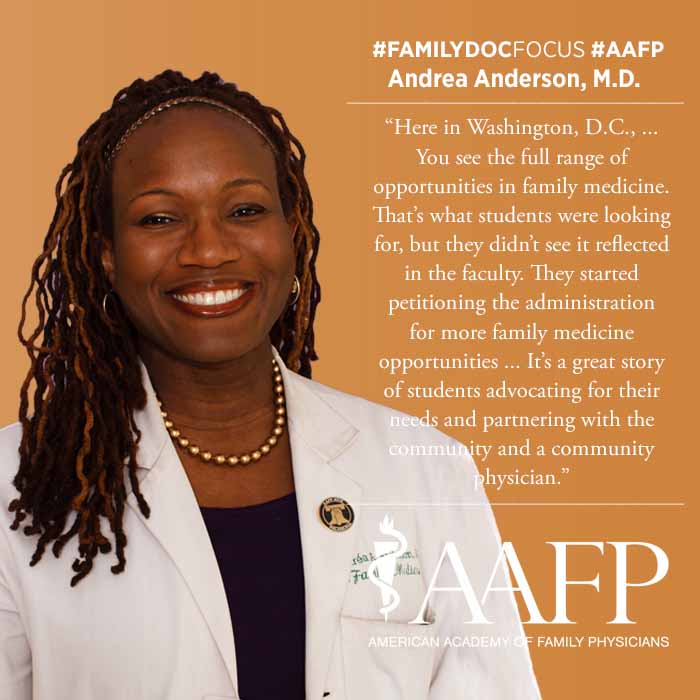A Needed Role Model and Advocate for Family Medicine
May 11, 2020 02:54 pm David Mitchell – For years, the George Washington University School of Medicine and Health Sciences didn't have a family medicine department, but students with an interest in primary care still had a strong family medicine advocate.

Andrea Anderson, M.D., practiced full-scope family medicine for nearly 15 years at her National Health Service Corps scholarship placement, a network of federally qualified health centers in Washington, D.C. During much of that time, she also served GW's medical school as an assistant clinical professor and community preceptor as its students rotated through the FQHC.
Not only did Anderson show students the breadth of family medicine at her practice, she also helped bring an array of family physician speakers to campus as the adviser for the school's family medicine interest group.
"We wanted to show them what family medicine is," she said. "Here in Washington, D.C., there is a plethora of family physicians involved in clinical work, education, policy, direct primary care, private practice and government roles. You see the full range of opportunities in family medicine. That's what students were looking for, but they didn't see it reflected in the faculty."
Fortunately for GW students, Anderson taught them not only to be advocates for their patients, but also for themselves.
"They started petitioning the administration for more family medicine opportunities -- more rotations, more faculty, more of a presence on campus," said Anderson, who completed the Society of Teachers of Family Medicine's Emerging Leaders Fellowship program in 2018 and was recognized in 2019 with STFM's National Advocate Award. "The administration was very responsive. It's a great story of students advocating for their needs and partnering with the community and a community physician."
Two years ago, the school took a step forward by creating a division of family medicine within its emergency medicine department.
"It's a different model," Anderson. "We're not an independent department."
Yet.
Anderson said the goal is for family medicine to ultimately be its own department with a residency program. It won't happen overnight. The division started with one full-time staff member -- chief Maria Portela Martinez, M.D., M.P.H. -- when it launched in August 2018. Anderson followed a year later as associate chief. The division now has four full-time staff physicians and three fellows.
Although the faculty numbers might not be big, GW's investment in family medicine is paying dividends already. Anderson said the school's family medicine match traditionally has been in the single digits -- sometimes none or one -- but 12 GW students matched to family medicine in 2019, followed by 14 more this year.
Anderson said one key factor in growing interest in family medicine has been "bringing as many students as possible each year to FUTURE (formerly the AAFP National Conference of Family Medicine Residents and Medical Students)." GW's FMIG was recognized as a Program of Excellence at the 2018 conference, and it brought nearly two dozen students to last summer's event in Kansas City, Mo.
Anderson has held numerous leadership positions on the state, regional and national levels and is currently a member of the ABFM Board of Directors and chair of the District of Columbia Board of Medicine. She also serves on various committees and task forces for the National Board of Medical Examiners, the Federation of State Medical Boards, the Family Medicine Education Consortium, STFM and the Washington, D.C., AFP.
Her roles with STFM include serving on the Academic Family Medicine Advocacy Committee and on a task force focused on the development and retention of underrepresented minority faculty. Anderson, who is African American, pointed out that less than 10% of full-time academic faculty are underrepresented minorities, including 3% who are African American.
"It's important that we continue to have effective voices in these roles and lead the charge on professionalism and identifying what it means to be a family physician," she said.